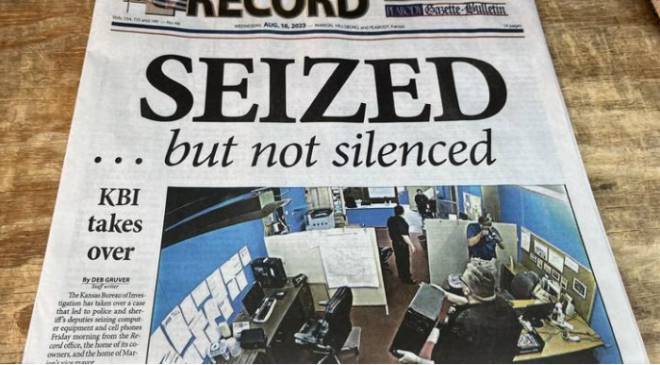TOPEKA, Kan. — A central Kansas police chief was not only on legally shaky ground when he ordered the raid of a weekly newspaper, experts said, but it may have been a criminal violation of civil rights, a former federal prosecutor added, saying: “I’d probably have the FBI starting to look.”
Read More:- Maui emergency management director defends decision to not sound sirens in fire
Some legal experts believe the Aug. 11 raid on the Marion County Record’s offices and the home of its publisher violated a federal privacy law that protects journalists from having their newsrooms searched. Some believe it violated a Kansas law that makes it more difficult to force reporters and editors to disclose their sources or unpublished material.
Part of the debate centers around Marion Police Chief Gideon Cody’s reasons for the raid. A warrant suggested that police were looking for evidence that the Record’s staff broke state laws against identity theft and computer crimes while verifying information about a local restaurant owner. But the police also seized the computer tower and personal cellphone belonging to a reporter who had investigated Cody’s background.
The raid brought international attention to the newspaper and the small town of 1,900 — foisted to the center of a debate over press freedoms. Recent events have exposed roiling divisions over local politics and the newspaper’s aggressive coverage. But it also focused an intense spotlight on Cody in only his third month on the job.
Read More:- ‘Blind Side’ Tuohy family says Michael Oher’s lawsuit is a ‘shakedown’
The investigation into whether the newspaper broke state laws continues, now led by the Kansas Bureau of Investigation. State Attorney General Kris Kobach has said he doesn’t see the KBI’s role as investigating the police’s conduct, and that prompted some to question whether the federal government would get involved. Spokespersons for the FBI and the U.S. Department of Justice declined to comment.
Stephen McAllister, a U.S. attorney for Kansas during former President Donald Trump’s administration, said the raid opened Cody, the city and others to lawsuits for alleged civil right violations. And, he added, “We also have some exposure to federal criminal prosecution.”
“I would be surprised if they are not looking at this, if they haven’t already been asked by various interests to look at it, and I would think they would take it seriously,” McAllister, a University of Kansas law professor who also served as the state’s solicitor general, said of federal officials.
Cody did not respond to an email seeking comment Friday, as he has not responded to other emails. But he did defend the raid in a Facebook post afterward, saying the federal law shielding journalists from newsroom searches makes an exception specifically for “when there is reason to believe the journalist is taking part in the underlying wrongdoing.”
Read More:- Colorado Police Chasing Serial Wedding Crasher Thief After Multiple Heists
Police seized computers, personal cellphones and a router from the newspaper. All items were released Wednesday to a computer forensics auditing firm hired by the newspaper’s attorney, after the local prosecutor concluded there wasn’t enough evidence to justify their seizure. The firm is examining whether files were accessed or copied.
The five-member Marion City Council was scheduled to have its first meeting since the raid Monday afternoon.



































